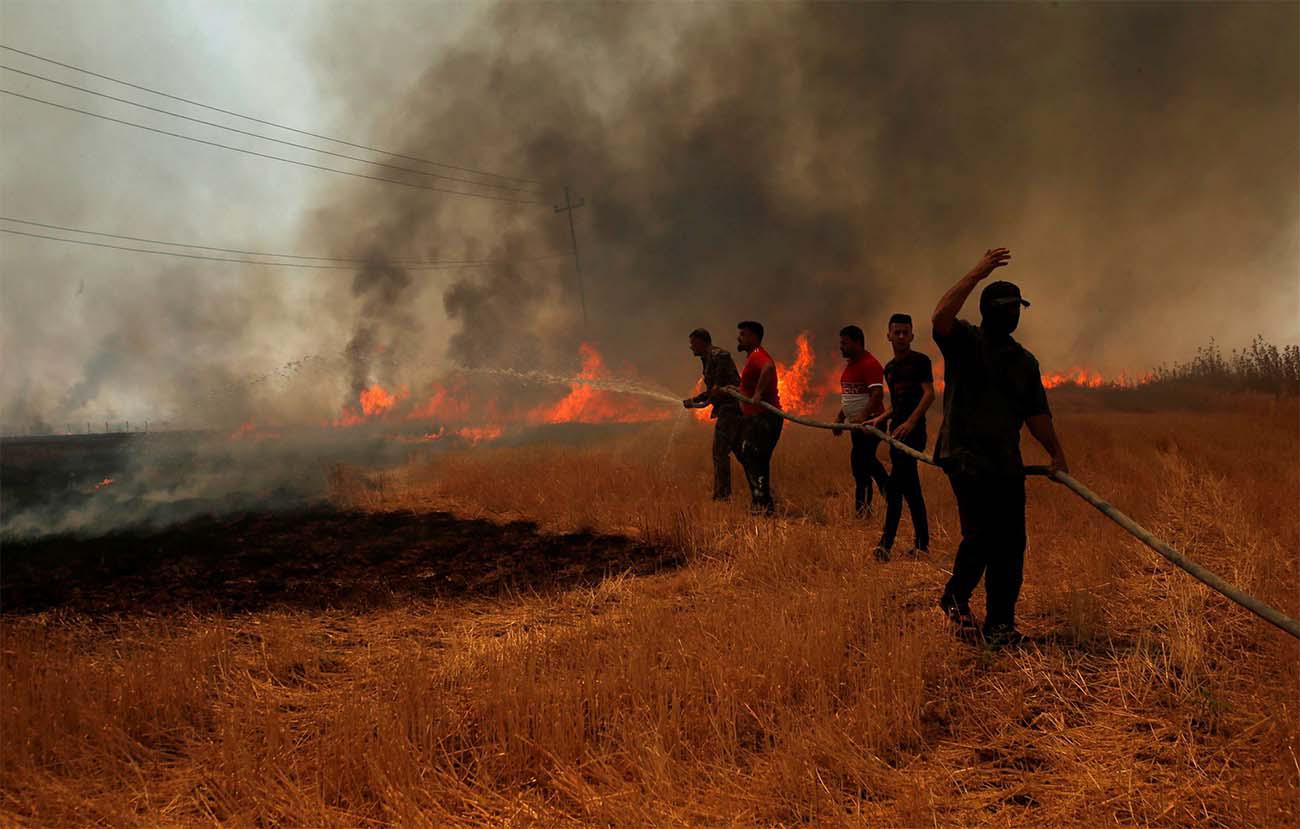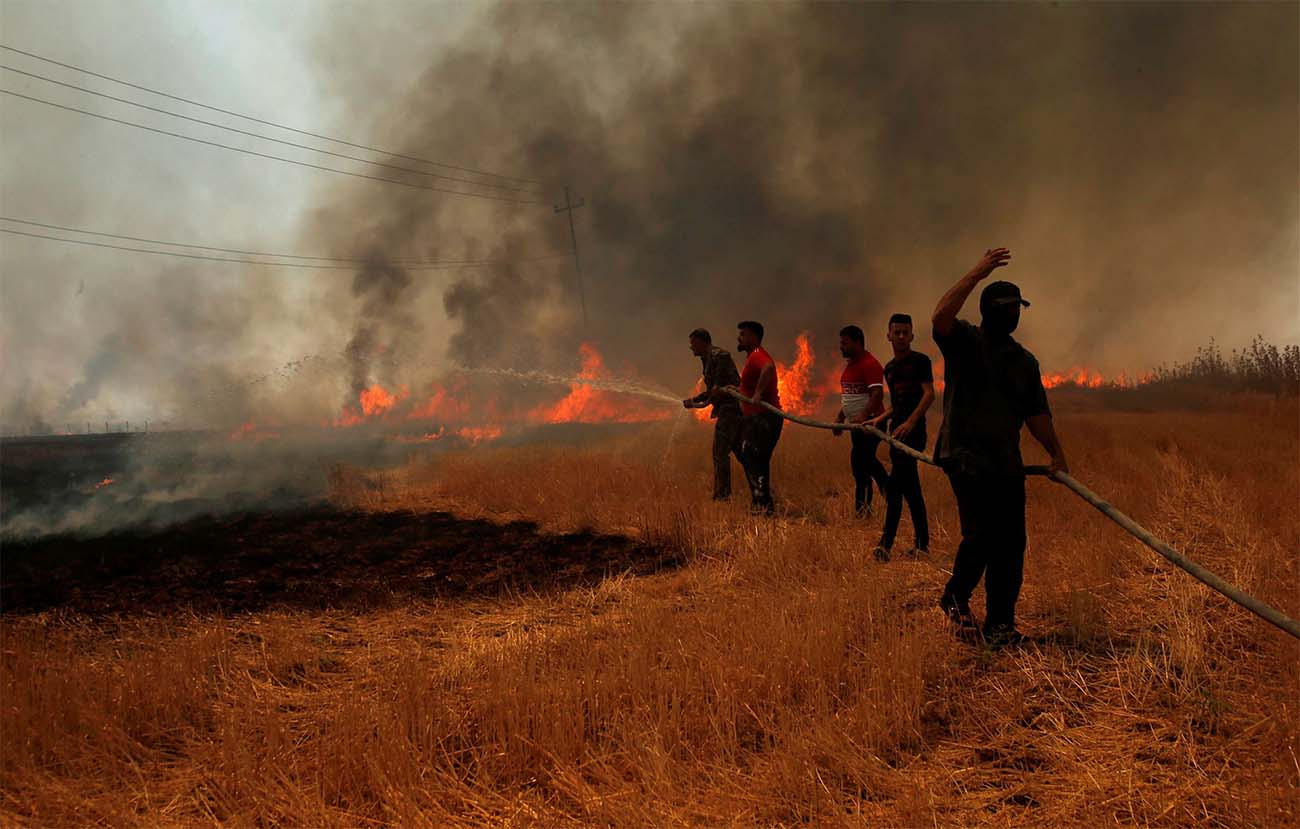Mystery fires in Iraq kill dream of food self-sufficiency
Despite achieving the highest wheat production rate since 1998, agricultural success in Iraq has been derailed by mysterious fires that have not been successfully explained.
Iraqi farmers, after years of work and benefiting from heavy rain, achieved self-sufficiency in wheat and barley production. Their efforts, however, were undone in mere hours when fires destroyed crops across various agricultural areas of northern Iraq.
Scenes of fires burning hundreds of hectares in Nineveh, Kirkuk and Saladin provinces appeared online in the first week of June and viewers shared speculative opinions over who was to blame and expressed their anguish over the colossal damage.
Wheat and barley harvesters reportedly lost fields equivalent to the size of 7,000 football pitches. It is still to be determined whether the fires were criminal acts, fate or due to scorching temperatures.
Speaking cautiously at a news conference in late May, Iraqi Prime Minister Adel Abdul-Mahdi downplayed the scale of damage and steered clear of naming potential culprits. Ruling out arson, Abdul-Mahdi described the damage as “not very large,” adding that “this happens elsewhere in the world due to extreme summer heat.”
However, statements by the Ministry of Agriculture are out of tune with the assessment the prime minister offered. “Incidents of fire cause damage that extends to the national economy,” Iraqi Minister of Agriculture Saleh al-Hassani said, citing a loss of one month of productive crop harvest.
Articles and statements published by Islamic State (ISIS) outlets claimed responsibility for the fires, which it branded as “punishment against apostates.” Details were not given other than confessions that read “thanks to the graciousness of God, hectares of wheat crops have been torched — hectares that belong to the apostates” in Khaniqeen and elsewhere.
Crops harvested by Kurdish farmers were also severely affected by the fires, which they claimed were set by men claiming to be ISIS members demanding tax payments, a peshmerga commander told Voice of America. Other reports contradict the claims, citing land disputes between Kurdish farmers and the Shammar tribe around Kirkuk, particularly in the village of Palkun.
“ISIS claimed dozens of fires but the others were certainly the product of land disputes, most often among tribes,” security analyst Hisham al-Hashimi told Agence France-Presse.
Farmers struck hardest by the setbacks shared controversial theories, including that the fires were set as a tactical measure to unsettle food security. Some blamed Popular Mobilisation Forces militias.
Iraq has long relied on foreign food imports both under the 1990s UN-designed sanctions regime and after the US-led invasion in 2003. Observers identified the rising trend of food self-sufficiency across a variety of items — fish, tomatoes, garlic and grain crops. The long-anticipated agricultural turn that promised to satisfy domestic food consumption and to pay farmers’ stacking debts will have to wait.
Setbacks were mourned as irreversible and uncountable but taking his lead from Abdul-Mahdi, Agricultural Ministry spokesman Hameed Nayef told Al Jazeera that media reporting had exaggerated the scale of damage.
Despite that, the ministry had no option other than to recognise the gravity of the disaster. The ministry set up a joint operations room, enlisting security and civil defence forces to put out the fires. During a meeting with senior ministerial staff, Hassani vowed to patrol high-risk areas and offer protection — a move awaiting security approval.
Jassim al-Jabara, a member of the parliamentary Security and Defence Committee, demanded greater action from the government in the form of financial compensation for farmers whose agricultural fields were torched.
Hassan Nassif al-Tamimi, president of the Federation of Agricultural Societies, described the horrors that beset Iraq as “deliberate ecocide” and “crimes against the economy.”
The narrative that holds ISIS responsible has proven popular as proponents pointed to the destruction of Beiji’s oil refinery as evidence of the consistent use of scorched-earth policies by ISIS.
The incident, however, speaks to another strategy — “mutual assured destruction” — to deny your opponent victory in the context of military stalemate.
Scorched-earth is a strategy that has proven popular in the past and has been applied by ISIS in Iraq and Syria but also by Iran-backed militias. It has been used in Diyala by Iran-leaning militias under the guise of security preparations or to exact sectarian revenge against Sunni families. Activists took to social media to claim that “regional powers” were responsible in order to threaten Iraq’s fast track to self-sufficiency.
Broader agrarian trends are equally important. In the past year, Basra’s Zubair district was struck by an unknown epidemic that destroyed 4,000 tomato farms and thousands of carp washed up dead across the Euphrates River. Those incidents came after the Ministry of Agriculture said Iraq had reached near self-sufficiency in fish and tomato production. Farmers and fishermen urged the government to investigate but inquiries were never initiated.
The truth lies somewhere along the space between the conflicting claims and as Iraq’s public demands answers, the government’s poor record when it comes to investigating crimes leaves few hopeful.
Nazli Tarzi is an independent journalist, whose writings and films focus on Iraq’s ancient history and contemporary political scene.
Copyright ©2019 The Arab Weekly







